Chapter V: Prayer and liturgy
- Entire (2.86 Mo)
- Part 1 (712 Ko)
- Part 2 (1.12 Mo)
- Part 3 (1.08 Mo)
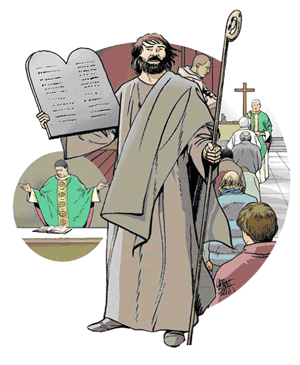 Proclaimed in the synagogue in Capernaum, Jesus' speech on the bread of life will reveal God's greatest sacrament, the Eucharist. Saint Francis then leads us down the road of prayer and contemplation, as he had already done with Brother Bernard and Brother Leon. Lastly the study of article 8 of our Rule will tell us how Jesus was the veritable adorer of the Father
Proclaimed in the synagogue in Capernaum, Jesus' speech on the bread of life will reveal God's greatest sacrament, the Eucharist. Saint Francis then leads us down the road of prayer and contemplation, as he had already done with Brother Bernard and Brother Leon. Lastly the study of article 8 of our Rule will tell us how Jesus was the veritable adorer of the Father
- 0
I AM THE BREAD OF LIFE
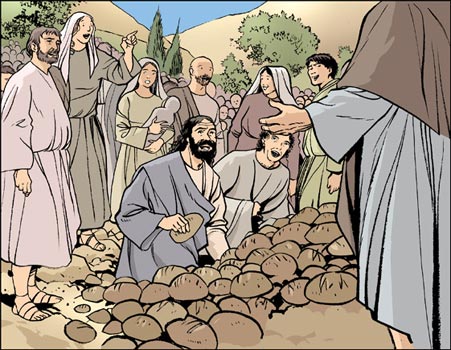
We are in the synagogue of Capernaum. Only a few hours ago, Christ multiplied the bread on the mountain. He now affirms this truth : « I am the bread of life. » Far from being accepted unanimously among all those who are listening, it creates a veritable scandal in the audience. And don't think that only the habitual detractors are shocked by these words which are difficult to understand and integrate. Of course these latter criticize and question, as usual we might say ; but it's among the disciples themselves that there is incredulity and from this moment, many leave Him. Many centuries later, the Eucharist, like the cross, is a mystery that so exceeds our human intelligence that it continues to be a stumbling block for man. But as you might imagine, it is indeed on the spiritual plane that we need to hear these words * The narrative which follows is composed of extracts from Centro Editoriale Valtortiano, Isola del Liri, Italy, The Gospel as It Was Revealed to Me, Maria Valtorta, Vol. 5, chap. 44, pp. 287 - 297..
Look to obtain food which gives eternal life
Jesus begins to speak : « Truly, I tell you : you look for me, not to listen to me nor for the miracles you have seen, but for this bread that I graciously gave you to eat till fully satisfied. For three fourths of you, that is why you look for me, and also out of curiosity. Perverted feeling wants extraordinary things so as to be moved and feel a shiver of excitement. Sensuality wants to satisfy its greed without effort through the bread that did not cost any sweat, since God gave it in His goodness. What is lacking in this search is the element of the supernatural spirit.
God's gifts are not ordinary, they're extraordinary. We cannot claim, nor let ourselves fall into laziness by saying : « God will give them to me. » It is said : « By the sweat of your brow you will eat bread... » If He who is Mercy said : « My heart is moved with pity for the crowd, for they have been with me now for three days and have nothing to eat. I do not want to send them away hungry, for fear they may collapse on the way. », nevertheless it isn't said that we should follow him for this reason. It isn't for the food which fills our bellies that we should follow him, but for that which nourishes the soul. For we are souls ! That is what we are ! The flesh is the clothing, the being is the soul, and it is the latter which is immortal. The flesh, like any clothing, becomes threadbare and is finished ; it doesn't deserve to be treated as if it was perfection to which every care had to be given.
Look then, for that which is just to obtain, not for that which is unjust. Look not to get the food which perishes, but that which gives eternal life. The latter, the Son of man will always give you, whenever you would like it. And if you have in you the food that does not perish, you can do God's works, being nourished with God's food. »
The assembly responds : « What must we do in order to accomplish God's works ? »
If a person does not have faith, he cannot believe my words
Jesus resumes : « It is true. You keep the Law, or rather you know the Law. But to know is not to do. We know, for example, Rome's laws and yet a faithful Israelite does not respect them other than in the ways imposed upon him as a subject. The Law that you know and the words of the Prophets should indeed nourish you in God and so give you the capacity to accomplish God's works. But in order for that to happen, they would have to have become one with you, like the air that you breathe and the food that you eat, which both change into life and blood. That is what I have come to teach and give : the juice, the air of the Law and the Prophets, to give lifeblood and breath to your souls which are dying from hunger and asphyxiation. You resemble children who have a sickness which renders them incapable of knowing what can sustain them. You have provisions but you don't know that they must be eaten in order to become sustenance, and that they must really become yours, by a true and pure faithfulness to the Lord's Law which spoke to Moses and to the Prophets for us all. Coming to Me to receive the air and juice of eternal Life is a duty. But this duty presupposes that you have faith. For if a person does not have faith, he cannot believe in my words, and if he doesn't believe, he doesn't come to tell me : « Give me the true bread. » And if he doesn't have the true bread, he cannot do God's works, not having the capacity to do them. Consequently, in order to be nourished in God and do His works, it is necessary to believe in He who God sent. »
Dissatisfied, the others retort : « But what miracles do you do, then, so that it is possible for us to believe in You as in one chosen by God and so that we can see God's seal on you ? What do you do that the Prophets, in a more modest way, haven't already done ? Moses even surpassed you, since not only once but for forty years he fed our fathers with wonderful food. For it is written that our fathers, for forty years, ate manna in the desert and it is thus said that Moses gave them bread from heaven to eat. »
It is not Moses who gave you bread from heaven, but the Father
« You are mistaken. It is not Moses, but the Lord, who did that. And in Exodus we read : « Look, I shall rain down bread for you from the heavens. Each day the people must go out and collect their ration for the day; I propose to test them in this way to see whether they will follow my law or not. On the sixth day, however, when they prepare what they have brought in, this must be twice as much as they collect on ordinary days so as to respect the seventh day, the Sabbath. » So it is not Moses, but the Lord, who gave the manna; God who can do anything and everything. Everything.
And remember what Wisdom says : since this bread came from heaven, from God, in His divine tenderness towards his children, He made it so that the taste and nutritional value for each person corresponded to his desire and need, being equally well adapted to a baby's underdeveloped stomach, as to the vigorous appetite and digestion of an adult, as to that of a delicate girl as to that of a feeble, old man.
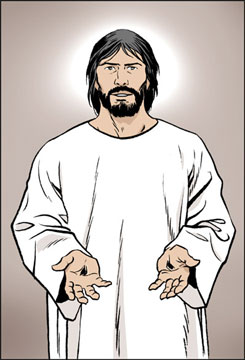 Praise the Eternal from the very first hour in the morning; that is what the manna taught the Hebrews, and I, I remind you of it because it is a duty which continues and will continue until the end of time. Seek the Lord and His heavenly gifts, without fail until late in the day or late in life. Rise and praise Him even before the sun rises, and feed on His word which consecrates and safeguards and leads to true Life. It wasn't Moses who gave you the bread of Heaven, but truly, He who gave it is God the Father. And now, indeed, it is my Father who gives you true Bread, new Bread, the eternal Bread which comes down from Heaven, the Bread of mercy, the Bread of Life, the Bread which gives Life to the world, the Bread which satisfies all hunger and removes all lethargy, the Bread which gives to the one who takes it eternal Life and eternal joy. »
Praise the Eternal from the very first hour in the morning; that is what the manna taught the Hebrews, and I, I remind you of it because it is a duty which continues and will continue until the end of time. Seek the Lord and His heavenly gifts, without fail until late in the day or late in life. Rise and praise Him even before the sun rises, and feed on His word which consecrates and safeguards and leads to true Life. It wasn't Moses who gave you the bread of Heaven, but truly, He who gave it is God the Father. And now, indeed, it is my Father who gives you true Bread, new Bread, the eternal Bread which comes down from Heaven, the Bread of mercy, the Bread of Life, the Bread which gives Life to the world, the Bread which satisfies all hunger and removes all lethargy, the Bread which gives to the one who takes it eternal Life and eternal joy. »
« Give us, Oh Lord, this bread and we will no longer die. »
You will die like all men die, but you will be restored to everlasting Life if you find your holy sustenance in this Bread, because it makes he who eats it incorruptible. As for you, it will be given to those who ask it of my Father with a pure heart, an upright intention and a holy charity. That is why I taught you to say : « Give us this day our daily bread. » But for those who feed on it shamefully, it will become a teeming of hellish worms, like the baskets of leftover manna kept against God’s express orders. And this Bread of health and life will become, for them, death and condemnation. For the greatest sacrilege will be committed by those who put this Bread on a corrupted and fetid spiritual table, and profane it by mixing it with the iniquity of their incurable passions. It would have been better for them to never have taken it ! »
« But where is this Bread ? How can we find it ? What is its name ? »
I am the Bread of Life
« I am the Bread of Life. It is in Me that it can be found. Its name is Jesus. He who comes to Me will never hunger, who believes in Me will never thirst, because the celestial rivers will flow out on him, extinguishing all material ardor. I will never turn away he who comes to Me, for I have come down from Heaven to do, not my will, but the will of He who sent me. And the Will of my Father, of the Father who sent me is this: that I do not lose even the least one of these whom He gave me, but that I raise them up on the last day. »
« But who then could hear God or see his face ? », ask several people who are beginning to show signs of irritation and indignation. And they finally say : « You are crazy or deluded. »
« No one has seen God except He who is from God. The latter has seen the Father, and I am Him. And now listen to the Creed of future Life without which we cannot be saved : truly, truly, I tell you that he who believes in Me has eternal Life. Truly, truly I tell you that I am the Bread of eternal Life.
Your fathers in the desert ate manna and they died, because manna was a holy, but temporal, food which gave life because it was necessary for his people to get to God's Promised Land. But the Manna that I am will have no limits in time or power. Not only is it celestial, but it is divine and it produces that which is divine : the incorruptibility, the immortality of that which God created in His image and likeness. It will not last forty days, forty months, forty years, forty centuries. It will last as long as Time lasts, and it will be given to all those who hunger for it with a hunger that is holy and pleasant to the Lord, who will rejoice in giving themselves unreservedly to men for whom He became flesh so that they would have Life which does not die.
I can give myself, I can transubstantiate myself for love of man, so that bread becomes Flesh and Flesh becomes Bread, to satisfy the spiritual hunger of men who without this Food would die of spiritual hunger and disease. If someone eats this Bread with righteousness, he will live eternally. The bread that I give will be my Flesh sacrificed for the Life of the world; it will be my Love spread in God’s houses so that those who love or are unhappy can come to the Lord's Table and find comfort for their need to merge into God and a relief for their pain. »
« But how can you give us your Flesh to eat ? Who do you take us for ? Bloodthirsty wild animals ? Savages ? Murderers ? We are disgusted by blood and crime. »
If you do not eat the Flesh of the Son of man and if you do not drink his Blood, you will not have Life in you
Truly, truly I tell you that often man is worse than a wild animal and that sin renders him worse than a savage, that pride gives a taste for murder, and that not everyone here is averse to blood and crime.
« Truly, truly, I tell you that if you do not eat the Flesh of the Son of man and if you do not drink his Blood, you will not have Life in you. He who eats my Flesh in a respectful and fitting manner and who drinks my Blood has everlasting Life and I will raise him up on the Last Day. For my Flesh is real Food and my Blood, real Drink. He who eats my Flesh and drinks my Blood lives in Me, and I live in him. Since the living Father sent me, and I draw life from the Father, so whoever eats me will also draw life from Me and will go where I send him, and he will do what I say and he will live with austerity like a man, and will be ardent like a seraphim, and he will be holy, for to get nourishment from my Flesh and my Blood, he will abstain from faults and he will live by raising himself so as to finish his ascension at the feet of the Eternal. »
« But that man is crazy ! Who can live that way ? In our religion, only the priest must purify himself to offer the sacrifice . Now He wants to make us so many victims of his madness. This doctrine is too hard and the language too difficult ! Who can listen to it and put it into practice ? » murmur those who are present, and several are very well-known followers.
The people disperse, all the while making many comments. Only the Master and the most faithful are left in the synagogue.
How have you listened and assimilated ?
« And you, do you take offense at what I told you ? And if I told you that you will one day see the Son of man ascend to heaven where He was before, and sit next to the Father ? And what did you understand, absorb, believe up to now ? And how have you listened and assimilated ? Only with what is human ? It is the spirit which gives life and is of value. The flesh is nothing. My words are spirit and life, and it is with the spirit that you should listen and understand them so as to have life. But there are many among you whose spirit is dead because they are without faith. Many among you do not really believe, and it is useless for them to stay near Me. They will not have Life, but Death. For they stay here, as I already said, out of curiosity or human affection, or worse, for reasons even more unworthy. They haven't been brought here by the Father as a reward for their goodwill, but by Satan. No one, truly, can come to me, if it hasn't been granted to him by the Father. Go away also, you who are humanly ashamed of abandoning me, but who are even more ashamed of staying in the service of someone who seems to you « crazy and hard ».
So, several others leave the group of disciples. In the synagogue, there are now Jesus, the chief of the synagogue and the apostles...
You alone have the words of everlasting Life
Jesus turns towards his apostles who, mortified, are huddled in a corner , and he says : « Do you wish to leave, you also ? » He says it without bitterness or sadness, but with great seriousness.
Peter in an impulse of suffering tells Him : « Lord, where would we go? Towards whom? You are our life and our love. You alone have the words of everlasting life. We know that You are the Christ, the Son of God.
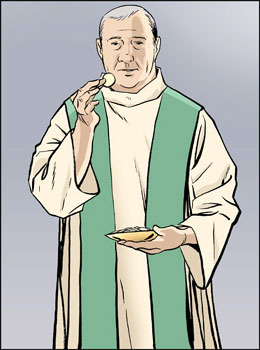
Amen
Peter’s response is a tremendous profession of faith, in spite of the incomprehension he also seems to have concerning what was just said by the Christ. Indeed, in his profession of faith, Peter does not say what, at that moment, he still does not understand: “I know that by eating Your Flesh and drinking Your Blood, I will have a share in everlasting Life.” No, but he affirms, much more simply, “You are our life and our love. You alone have the words of everlasting life. We know that You are the Christ, the Son of God.”
Let’s consider that at the moment of communion, while the priest presents the consecrated host to the faithful and says: “The body of Christ”, and the faithful respond: “Amen”, that Amen is perhaps above all the same expression of Peter’s faith, the recognition of our littleness compared to He who gives us Life * Our vocation to eternal life is supernatural. It depends entirely on God's gratuitous initiative, for he alone can reveal and give himself. It surpasses the power of human intellect and will, as that of every other creature. CCC 1998.. Amen is the Hebrew word which means: “I believe.” * In Hebrew, amen comes from the same root as the word "believe." This root expresses solidity, trustworthiness, faithfulness. CCC 1062. Yes: I believe that it is the body of Christ being offered to me and no longer a simple piece of bread. * In the epiclesis, the Church asks the Father to send his Holy Spirit (or the power of his blessing) on the bread and wine, so that by his power they may become the body and blood of Jesus Christ and so that those who take part in the Eucharist may be one body and one spirit (some liturgical traditions put the epiclesis after the anamnesis). In the institution narrative, the power of the words and the action of Christ, and the power of the Holy Spirit, make sacramentally present under the species of bread and wine Christ's body and blood, his sacrifice offered on the cross once for all. CCC1353 Yes: I believe that by the Body of Christ, God sanctifies the world * Spiritual progress tends toward ever more intimate union with Christ. This union is called "mystical" because it participates in the mystery of Christ through the sacraments - "the holy mysteries" - and, in him, in the mystery of the Holy Trinity. God calls us all to this intimate union with him, even if the special graces or extraordinary signs of this mystical life are granted only to some for the sake of manifesting the gratuitous gift given to all. CCC 2014.. Yes, I believe that in the Holy Spirit, the Eucharist is the summit of worship * Worship contains all the acts through which a human community honors its gods and maintains its relations with them. One cultivates the relationship with God as one cultivates a friendship: one « takes care of » the divinity for itself and for its benefits. Worship is the human part of the liturgy: the society of men, who care about maintaining their link with God. The too human part, when it is too interested and risks deviating into magic; the true and just part when it is, in act, the yes of men so as to encounter God. (C.L.D. Editions 1983, Dictionary of Liturgy, Dom Robert Le Gall, definition of worship (extracts) p. 83). that men render to Christ and, through Him, to the Father. Yes, I believe that this communion brings about the unity of the people of God * And as there is one loaf, so we, although there are many of us, are one single body, for we all share in the one loaf. 1 Co 10:17..
Would the apostles be the only ones to have benefited from the Eucharist ?
« Take and eat… take and eat.” But the evening of Maundy Thursday, we weren’t, ourselves, in Jerusalem. Was the announcement that Jesus Christ made in the Capernaum synagogue only addressed to those who were present at the institution of the Last Supper, the evening of the famous Holy Thursday. Of course not! Jesus came to save all men, and He proclaims it in the synagogue, thus specifying for us that the promise of everlasting life is not only for a handful of individuals, but indeed for all humanity: “I am the living bread which has come down from heaven. Anyone who eats this bread will live forever; and the bread that I shall give is my flesh, for the life of the world.” (Jn 6 :51) Yes ! It is truly for all humanity. But aren’t the words that the priest pronounces at the moment of consecration simply in remembrance of Jesus Christ, not producing any effect on the species present on the altar, the latter being reduced to just a symbolic gesture. Through the consecration and the intervention of the Holy Spirit, “the bread becomes Jesus’ flesh. In the same way, the wine becomes his blood. It is in the capacity of his shed blood that he is manifest in this cup, and it is for that reason that he seals the true covenant between God and us. The old covenant was real, but it had above all value because of its inclusion in the new covenant, which is definitive. The blood shed in Christ’s Passion is for us the source of all good, the forgiveness of our sins, divine grace, supernatural virtues, praiseworthy acts, everlasting glory. This covenant is, strictly speaking, Jesus’ testament, who is going to die and who gives his blood. And in the same way that since the Exodus all the sons of Israel eat lamb in remembrance of what their forefathers ate before escaping the scourge which threatened them, Christian generations are invited to eat the flesh and drink the blood of the divine Lamb. To do this, we need the priesthood to continue to do “this in remembrance of Jesus”, the priesthood participating with the Messiah, priest according to the order of Melchizedek. * Bookseller LECOFFRE J. GABALDA and Co. Editors 1993, Synopsis of the four Gospels in French, Lagrange and Lavergne, p. 221, note 259.
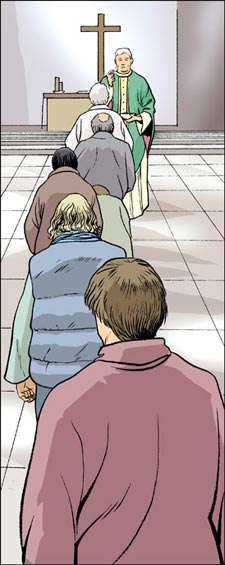
The « amount » of Bread and Wine is limitless
God’s love is without limit. So we don’t have to try to “measure” the “weight” of communion wafers and the “number of liters” of wine which have been consumed since Jesus Christ’s institution of the Eucharist, and compare them to the “weight” of a man. The Gospel passage of the feeding of the five thousand * First multiplication of the loaves in Mt 14 :13-21, Lk 9:10-17, Mk 6:31-44, Jn 6:1-14. Second multiplication of the loaves in Mt 15 :32-39 and Mk 8 :1-9. shows us divine power doing what simple human nature cannot.
When evening had come, the disciples approach Jesus and say : « Dismiss them so that they can go to the surrounding farms and villages and buy themselves something to eat!” But Jesus tells them: “They don’t need to leave. Give them some food yourselves.” The disciples respond that they don’t have the material means to feed such a crowd; indeed the crowd comprises about five thousand men, not counting the women and children, who also need food. "We have five loaves and two fish." say the disciples. In other words, it is impossible to feed this crowd! But what is impossible for man is possible for God. And Jesus, after having asked the disciples to bring him what they have, takes the five loaves and the two fish and, as he will do on the evening of Holy Thursday, He looks up to heaven and says the blessing. He breaks the loaves and gives them to the disciples to set before the people. They all eat and are satisfied. And as if to show that the multiplication of the loaves doesn’t stop at just those who are present, “they picked up twelve full baskets”, as many as there are apostles. These apostles, assisted by priests, will then have the mission of distributing the Eucharist all over the world. And as Christ multiplied the loaves to feed the crowd, they will do it through words of consecration and the intervention of the Holy Spirit. Man will continue to bring his part to the table. It won’t be the five loaves and the two fish, but bread, fruit of the earth and the labor of men, and wine, fruit of the vine and the labor of men. God’s intervention will do the rest: He will fully sanctify the offering through the power of his blessing; He will render it perfect and worthy of Him; it will thus become, for us, the body and blood of his beloved Son, Jesus Christ our Lord.
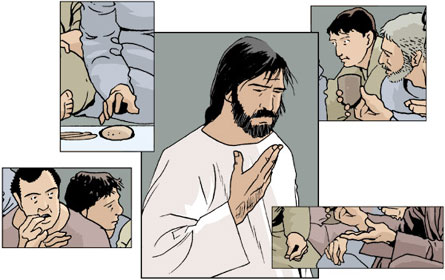
How to receive the Body and Blood of Christ ?
Let’s make a comparison. If we were to receive at our family table our country’s head of State, how would we dress for the occasion? Would we stay in our gardening clothes or would we put on a suit with a well-ironed white shirt? Would we use the everyday dishes, a bit mismatched, or the best china with the good silverware and stemmed glasses? We would certainly choose the best for our exceptional guest, even if we don’t agree with him or her on every issue. In spite of everything, we would use the best because of the guest’s position: first representative of the country. To use and do what is best would simply be the most elementary duty of a citizen.
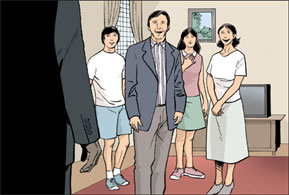 In the same way, to receive the Body and Blood of the Lord in our heart, how are we going to dress our soul ? Are we going to leave it black with all the mistakes we made or are we going to clean it with humility, purity, and dress it with charity? Truly, anyone who desires to receive Christ in Eucharistic communion must be in a state of grace * See on this subject § reconciliation, sources of grace in the preceding chapter of this manual.. Anyone aware of having sinned mortally must not receive communion without having received absolution in the sacrament of penance * CCC 1415.. Receiving Christ in the Eucharistic communion in a state of mortal sin * Mortal sin destroys charity in the heart of man by a grave violation of God's law; it turns man away from God, who is his ultimate end and his beatitude, by preferring an inferior good to him. Mortal sin, by attacking the vital principle within us - that is, charity - necessitates a new initiative of God's mercy and a conversion of heart which is normally accomplished within the setting of the sacrament of reconciliation. CCC 1855 and 1856 (extracts). Venial sin allows charity to subsist, even though it offends and wounds it. (CCC 1855). “While he is in the flesh, man cannot help but have at least some light sins. But do not despise these sins which we call "light": if you take them for light when you weigh them, tremble when you count them. A number of light objects make a great mass; a number of drops fill a river; a number of grains make a heap. What then is our hope ? Above all, confession.” St. Augustine, In ep. Jo. 1,6 is a grave offense against God. He who does this, instead of promoting his own salvation, does just the opposite: he is heading for damnation. A great sinner is like a seriously ill person, but it is a sickness of the soul. Do we give the same food to a very sick person as we do to a healthy one? No! To the sick, we give a strict diet and adapted medecine. When he gets his health back, then he can again go back to normal food. Concerning the soul, the same thing applies. The medecine is found in repentance and the sacrament of reconciliation. As to the nourishment for the soul, it is the Eucharist.
In the same way, to receive the Body and Blood of the Lord in our heart, how are we going to dress our soul ? Are we going to leave it black with all the mistakes we made or are we going to clean it with humility, purity, and dress it with charity? Truly, anyone who desires to receive Christ in Eucharistic communion must be in a state of grace * See on this subject § reconciliation, sources of grace in the preceding chapter of this manual.. Anyone aware of having sinned mortally must not receive communion without having received absolution in the sacrament of penance * CCC 1415.. Receiving Christ in the Eucharistic communion in a state of mortal sin * Mortal sin destroys charity in the heart of man by a grave violation of God's law; it turns man away from God, who is his ultimate end and his beatitude, by preferring an inferior good to him. Mortal sin, by attacking the vital principle within us - that is, charity - necessitates a new initiative of God's mercy and a conversion of heart which is normally accomplished within the setting of the sacrament of reconciliation. CCC 1855 and 1856 (extracts). Venial sin allows charity to subsist, even though it offends and wounds it. (CCC 1855). “While he is in the flesh, man cannot help but have at least some light sins. But do not despise these sins which we call "light": if you take them for light when you weigh them, tremble when you count them. A number of light objects make a great mass; a number of drops fill a river; a number of grains make a heap. What then is our hope ? Above all, confession.” St. Augustine, In ep. Jo. 1,6 is a grave offense against God. He who does this, instead of promoting his own salvation, does just the opposite: he is heading for damnation. A great sinner is like a seriously ill person, but it is a sickness of the soul. Do we give the same food to a very sick person as we do to a healthy one? No! To the sick, we give a strict diet and adapted medecine. When he gets his health back, then he can again go back to normal food. Concerning the soul, the same thing applies. The medecine is found in repentance and the sacrament of reconciliation. As to the nourishment for the soul, it is the Eucharist.
Before closing the first part of this chapter, let’s reread this first admonition of Francis which concerns the Body of the Lord. * Though priests and the faithful had a tendency to lose sight of the sacrificial character of mass and stopped having communion, Francis of Assisi, always guided by the Gospel and the teachings of the Church, gives us a quite different point of view. His writings clearly teach us about his understanding of the Eucharistic faith. What Francis says in his writings doesn’t represent a complete teaching, addressing all aspects of the Eucharist. He simply shows us the major principles of his faith. We can highlight two of them : 1) The Eucharist is a continuation of the revelatory embodiment; 2) The Eucharist commemorates the redeeming sacrifice. It is essentially in this first admonition that we discover the first important point of Francis’ Eucharistic faith. We only need to count the number of times the words spirit and see appear in the text. Francis’ teaching is that, by the grace of the Holy Spirit alone, the faithful can see the Lord in the Eucharist and receive it accordingly. Moreover, we can only go to the Father through the Son; however the Son no longer lives with us in human form, but in the form of the Eucharist. May we then “see” the Eucharist with the Spirit’s eyes and recognize there the presence of the Son of God. (Franciscan Editions, Paris, 1989, Christ in the thinking of Saint Francis of Assisi according to his writings, Norbert Nguyên Van Khanh, OFM., extracts from pp. 195, 197 and 201)
The Body of the Lord
The Lord Jesus says to his disciples: “I am the Way; the Truth and Life. No one can come to the Father except through me. If you know me, you will know my Father too. From this moment you know him and have seen him. »
Philip said, 'Lord, show us the Father and then we shall be satisfied.' Jesus said to him, 'Have I been with you all this time, Philip, and you still do not know me? 'Anyone who has seen me has seen the Father, so how can you say, "Show us the Father"? (Jn 14 :6-9).
The Father dwells in unapproachable light; God is spirit; no one has ever seen God. Since God is spirit, we can only see Him through the Spirit, for it is the Spirit which gives life, the flesh is as nothing.
It is the same for the Son: in as much as He is equal to the Father, we cannot see Him other than as the Father, other than through the Spirit.
That is why all those who in the past only saw man in the Lord Jesus Christ, without seeing nor believing, according to the Spirit and to God, that He is truly the Son of God, were damned. Likewise, all those today who are the same are damned: they clearly see, in the form of bread and wine, the sacrament of the Body of Christ, consecrated on the altar by the hands of the priest using the words of the Lord; but they do not see nor believe, according to the Spirit and to God, that there, before them, are truly the very holy Body and Blood of our Lord Jesus Christ, in testimony of the Almighty Himself who affirms: this is my Body and the Blood of the new covenant, which will be poured out for the multitudes, as well as: he who eats my flesh and drinks my blood will have everlasting life.
The Spirit of the Lord : He lives in those who believe in Him ; it is then he who receives the very holy Body and Blood of the Lord. * We can better understand this affirmation in the light of the doctrine, then quite common, of Peter Lombard, who identified sanctifying grace and Holy Spirit. At the time of Saint Francis this doctrine had not been condemned. It is only later that the Bonaventures and the Thomas introduce the enlightening distinction between created grace (which makes man a son of God) and uncreated grace (which is precisely the Holy Spirit) : Bréviloque V, 1-2 ; Summa Theol. III, 2, 10, and 1, 38, 1-2. (Franciscan Editions 1981, Saint Francis of Assisi - Documents, Théophile DESBONNETS et Damien VORREUX, note 12 p. 40) All the others, those who have no part at all in this Spirit, if they have the audacity to receive the Lord, eat and drink their own condemnation.
Carnal generation, how much longer will you be so hardhearted? Why not recognize the truth? Why not believe in the Son of Man? Look : every day He humbles himself, exactly like the time where, leaving His royal palace, He became incarnate in the womb of the Virgin; every day He himself comes to us, and in the most humble form; every day He descends from the bosom of his Father to the altar between the priest’s hand. And just as before He appeared to the holy apostles in very real flesh, He now appears to us in the sacred bread. The apostles, when they looked at Him with their human eyes, only saw His flesh, but they contemplated Him with the spirit’s eyes, and they believed that He was God. We, also, when with our human eyes we see the bread and the wine, should firmly know and believe it is there, real and living, the very holy Body and Blood of the Lord. Such is indeed the means that He chose to always be with those who believe in Him, as He himself said: “I am with you until the end of the world * Adm 1..”
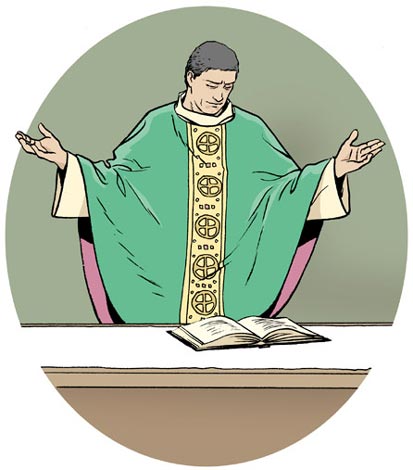
PATH OF CONTEMPLATION
We are now going to come back to Francis in two episodes of his life during which we are going to see him in action in the company of his brothers. Though the first occasion takes place at the very beginning of Francis’ fraternal life, with the arrival of Bernard of Quintavalle, the second is from the time near the end of his life, in that episode of Mount Laverne, with the very charming Brother Leo. We will see how he helps each one in their quest for the Lord.
A very strange spectacle
It has already been two years since Francis, in front of the Bishop of Assisi, stripped himself of his possessions. Since that day, Francis has restored three churches which were in a sad state of dilapidation. This work, however, has not brought him all the goodwill of Assisi’s population nor that of his old friends: “Well, children, look at that fellow passing by. It’s that oddball again who had everything he needed to be happy and who threw it all away to repair chapels. Look here, since he wants stones, you have only to throw some at him when he goes by. Ah, ah, maybe that’ll set his head straight and bring him down to earth, the poor madman!” “Well, it’s our friend Francis! So then Francis, is the sun still shining so strongly on you? Ah, but it looks like it! Oh dear, the matter is very serious. And the chapels, are they progressing ? Do you enjoy playing at masonry, son of a cloth merchant?” But to all that, Francis does not respond. He doesn’t seem to be in the least affected, a little like a deaf man who you could say anything to, who wouldn’t react because he couldn’t hear. Not that he despises all those who insult him or even that he takes pleasure in suffering indignities. But for the person who makes the effort to look on with the spirit, it seems rather that a little something transports Francis outside of the human realm, rendering him patient and constant as if he was deaf and dumb.
The invitation of Lord Bernard of Quintavalle
A man, however, is struck by Francis’ patience and constancy. That man is one of the noblest and richest in the city: it is Lord Bernard of Quintavalle. And in Assisi, Lord Bernard of Quintavalle is far from unknown. His great wisdom makes him loved and admired by all. He comes to the conclusion that if Francis, loathed and despised by everyone, remains so patient, constant and gentle, it is because he has received great grace from the Lord. One day, coming across him in the streets of Assisi, Bernard throws out to Francis, “It would be a great pleasure to have you to dinner this evening.
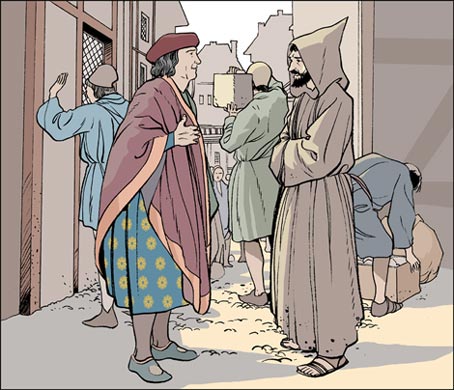 Will you come?” And Francis responds, “Oh, Lord Bernard, if it pleases you for me to come to dinner in your home, then I accept your invitation.”
Will you come?” And Francis responds, “Oh, Lord Bernard, if it pleases you for me to come to dinner in your home, then I accept your invitation.”
The evening come, both dinner guests eat the dishes prepared for them but are after all more absorbed in their conversation than in the meal. The subject; it must be said, has more than enough to engage their attention: the Christ, true God and true man, is Lord and Servant. Bernard is struck by Francis’ vision of Christ. Through simple words, everything seems so clear, so obvious and so…exhilarating. Hearing Francis’ words, Lord Bernard’s heart beats very strongly in his chest. His first impression is confirmed. Francis, even though he is considered a fool in the eyes of Assisi’s population, is touched by grace, and it is this which motivates his actions, moves him and indeed, which gives him breath. When the conversation ends, the night is well advanced. “I can’t let you leave at this hour of the night. I have two beds in my room, you can sleep in the other one. Stay, please.” Francis accepts Lord Bernard’s invitation and both go to bed and apparently to sleep.
« My God, my God », and nothing else
Apparently, then, they both fall asleep. Francis, as soon as he enters the bedroom, collapses of fatigue onto his bed. As for Lord Bernard, he also in turn lies down and is quickly snoring vigorously, as if he were sleeping.
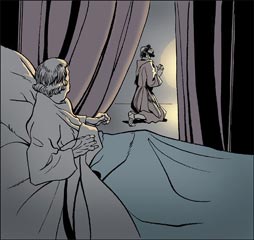 For neither of them are really asleep. Lord Bernard had gotten it into his head to test Francis’ holiness and was pretending to sleep to find out what would happen. And Francis was also pretending to sleep for he had only one desire, to pray. But faithful to the gospel words which say not to pray in public places so as to be admired by men, but rather to pray to the Father in secret (Mt 6:5-6), he waited until Lord Bernard had fallen asleep. And as soon as he believes him asleep, Francis noiselessly gets up, turns toward the open window, and kneels. Thanks to a small lamp always lit during the night, Lord Bernard loses nothing of Francis’ actions and gestures. He sees him kneeling, eyes and hands raised to the sky, and hears him praying, “My God! My God!”. That is, moreover, Francis’ entire prayer, « My God ! My God ! » and nothing else. Bernard, however, often entangled in the formulas of ready-made prayers, hears this simple prayer, “My God! My God!” These words penetrate into his heart at that instant with the sweetness of milk and honey. Up until then, he was pretending to sleep so as to test, we could even say measure, Francis’ holiness. But that is no longer a consideration at that precise moment. This prayer that he hears spoken takes him over entirely. It reveals to him what he is called to do, what we are all called to do, “Toward You, Lord”. That moment must have left a permanent impression on him, for the Fioretti tell us that after having become Brother Bernard, he received so much grace that he was often filled with delight in his contemplation of God. But let’s not get too far ahead of ourselves; let’s return to the chronological order of the narrative.
For neither of them are really asleep. Lord Bernard had gotten it into his head to test Francis’ holiness and was pretending to sleep to find out what would happen. And Francis was also pretending to sleep for he had only one desire, to pray. But faithful to the gospel words which say not to pray in public places so as to be admired by men, but rather to pray to the Father in secret (Mt 6:5-6), he waited until Lord Bernard had fallen asleep. And as soon as he believes him asleep, Francis noiselessly gets up, turns toward the open window, and kneels. Thanks to a small lamp always lit during the night, Lord Bernard loses nothing of Francis’ actions and gestures. He sees him kneeling, eyes and hands raised to the sky, and hears him praying, “My God! My God!”. That is, moreover, Francis’ entire prayer, « My God ! My God ! » and nothing else. Bernard, however, often entangled in the formulas of ready-made prayers, hears this simple prayer, “My God! My God!” These words penetrate into his heart at that instant with the sweetness of milk and honey. Up until then, he was pretending to sleep so as to test, we could even say measure, Francis’ holiness. But that is no longer a consideration at that precise moment. This prayer that he hears spoken takes him over entirely. It reveals to him what he is called to do, what we are all called to do, “Toward You, Lord”. That moment must have left a permanent impression on him, for the Fioretti tell us that after having become Brother Bernard, he received so much grace that he was often filled with delight in his contemplation of God. But let’s not get too far ahead of ourselves; let’s return to the chronological order of the narrative.
Through the Gospels
In the early morning, after all the household is awake, Lord Bernard reveals his intention to Francis in these terms, « I have completely decided in my heart to abandon the world and to follow you in whatever way you order me.” To the joy that Francis expresses at this conversion is mixed a feeling of the seriousness of the matter, the infinite trust which Lord Bernard has in him, “to follow you in whatever way you order me.” Francis cannot be responsible in that way for the life of another person. And so he invites Bernard to take advice from the main interested party with the involvement of Francis himself. “Lord Bernard, what you are saying is so serious and potentially so life changing that we need to present it to Our Lord Jesus Christ for consideration. We are going to pray that He show us His will on this point and that we be guided in carrying it out. Let’s go together to the Bishop’s palace where there is a good priest. We will have a mass said. We shall stay in prayer until Terce * The fourth of the canonical hours which were recited around 9 o’clock. and we shall pray that God, by the means of three openings of the missal, show us the path that is pleasing to Him for us to follow.” Lord Bernard, who was expecting anything except this, responded in spite of everything that the plan was agreeable to him in every respect. They go to the Bishop’s palace then and everything happens as it was decided. The priest, faced with the serious attitude and personality of Lord Bernard of Quintavalle, complies with the two companions’ unusual request. Three times, he opens the missal in the name of Jesus Christ and reads each time the first words his eyes alight on. And these words are as follows:
- at the first opening : « If you wish to be perfect, go and sell your possessions and give the money to the poor, and you will have treasure in heaven; then come, follow me. » (Mt 19 : 21).
- at the second opening : « Take nothing for the journey: neither staff, nor haversack, nor footwear, nor money » * Lk 9 : 3. Saint Luke’s text doesn’t speak about footwear, but see Mt 10: 10..
- at the third opening : « If anyone wants to be a follower of mine, let him renounce himself and take up his cross and follow me. » (Mt 16 : 24).
So Francis says to Lord Bernard, « Here is the advice that Christ gives us ; go and do all that you have heard ; and blessed is Our Lord Jesus Christ who deigned to show us through his gospels.” At these words, Lord Bernard goes off to sell everything he possesses, that’s to say a lot, for as we have already mentioned, he is very rich. And he distributes the proceeds from the sales to the poor, widows, orphans, pilgrims, monasteries and hospitals. Let’s note in passing that none of all those riches goes into Francis’ hands, who is helping in this merciful work. And Lord Bernard of Quintavalle becomes Brother Bernard. Later, Francis will say of him, “he is worthy of respect and he founded the Order, since he was the first to have abandoned the world without keeping anything for himself, but giving it all to the poor in Christ.”
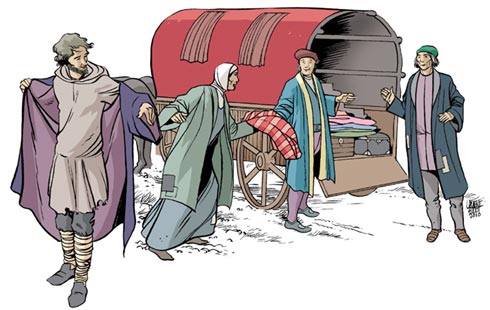
My God, I look for you as soon as the sun rises, my soul thirsts for you
In this story, Francis strives with all his being toward union with the God of life: “My God! My God!” But is it really Francis who is seeking this union? Isn’t his prayer rather his response to God’s desire? Because the entire history of Israel shows this essential truth: it isn’t man who, in the first instance, strives toward union with God; it is God Himself who took the first step in forming a relationship with man and desires to unite himself to man, or more precisely, unite man to himself. We cannot say it enough: the most important thing in a life of union with God isn’t man’s ever uncertain path towards God, but rather the path that God Himself took and continues unceasingly to take towards man. Before any yearning on the part of man there is God’s loving initiative to meet and communicate Himself to man. The soul’s path to God always has its starting point in God. When man sets off on his quest, as Bernard of Quintavalle did in this story, God has already come to him. And man’s movement is none other than a deeper awareness and more loving welcome of God’s communication. Thus we must first learn to look at, to contemplate, God’s communication of himself that He gives us, as Francis could and did do. * With a few minor unavoidable changes (extracts and/or additions) made necessary in order to integrate the copied text into the training manual, the commentary on this paragraph, a part of the comments afterwards and the story about Mount Laverne and the nursery (crib) are extracts from Desclée of Brouwer, 1995, The Path of contemplation, Eloi Leclerc, Prologue, Ch. 1 and Conclusion.
Look ! Contemplate !
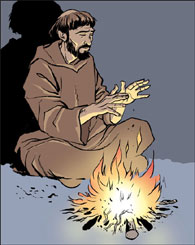 We only see well in the light, only with the light. And Jesus tells us, “I am the light of the world” (Jn 8:12). He goes on to tell us furthermore, “The lamp of the body is the eye. If your eye is sound, your whole body will be filled with light; but if your eye is bad, your whole body will be in darkness” (Mt 6 :22-23). Jesus gives us Himself to look at and contemplate. The meaning targeted here by the word eye is not limited to the moral aspect * It is moreover the miracle of the multiplication of the Word, for as there was the multiplication of the loaves, so too the Word of God is multiplied and received in its three aspects: spiritual, moral and physical., even if that is part of it. To the physical light which the eye, healthy or sick, withholds or refuses the benefits to the body, is compared the spiritual light which shines from the soul: if it is itself in darkness, this blindness is indeed worse than that of physical blindness. But if the eye contemplates He who is, who was and who will be, then the entire soul is in the light. And man always becomes that which he contemplates. This way of looking enables us to participate in divine life. It enables us to live in God.
We only see well in the light, only with the light. And Jesus tells us, “I am the light of the world” (Jn 8:12). He goes on to tell us furthermore, “The lamp of the body is the eye. If your eye is sound, your whole body will be filled with light; but if your eye is bad, your whole body will be in darkness” (Mt 6 :22-23). Jesus gives us Himself to look at and contemplate. The meaning targeted here by the word eye is not limited to the moral aspect * It is moreover the miracle of the multiplication of the Word, for as there was the multiplication of the loaves, so too the Word of God is multiplied and received in its three aspects: spiritual, moral and physical., even if that is part of it. To the physical light which the eye, healthy or sick, withholds or refuses the benefits to the body, is compared the spiritual light which shines from the soul: if it is itself in darkness, this blindness is indeed worse than that of physical blindness. But if the eye contemplates He who is, who was and who will be, then the entire soul is in the light. And man always becomes that which he contemplates. This way of looking enables us to participate in divine life. It enables us to live in God.
It is not about striving for God, but to welcome Him into an ever greater and simpler inner peace. We are not aiming towards the sun; we are not looking to attain it; the sun comes to us; its rays touch us even before we can see them. “…it is not we who loved God, but God loved us” (1 Jn 4 :10). “We love because He first loved us » (1 Jn 4 :19).
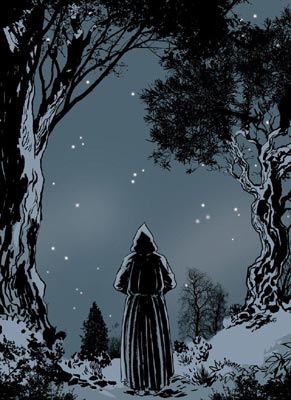
Faith in God’s Word
We already talked, in the beginning of this chapter, about the necessity of having faith in God’s Word in order to understand the speech about the Bread of Life. Concerning participation in divine life through prayer, we find this same necessity. Indeed, nothing other than faith in the Word, can assure us nor even allow us to think that infinite God communicates with us in his holiness and his glory, and that He unites us with him. And this union with God will be all the more intense the livelier our faith is. Francis, in the means used to respond to Lord Bernard’s quest, puts into practice in a radical and unswerving way the Word of God. : « If you wish to be perfect, go and sell your possessions and give the money to the poor, then come, follow me. » He hears the Word; immediately follows it and moreover, lives by it. Francis’ experience of communion with Christ is through faith. It has no other support than the Word. It is in His Word that the living God communicates with us. The Word is not the vision. It always calls on faith. Francis believes in the Word. And he lives by it. He makes it real, bringing to life Paul’s letter to the Galatians : « and yet I am alive; yet it is no longer I, but Christ living in me. » (Ga 2 :20).
I give thanks to you, Father, for having created the visible and invisible world
It was on a beautiful night at the end of summer on Mount Laverne. After a very hot day, it was good to feel a little fresh air. The nearby forest, crushed by the day’s sun, slowly got its breath back. Through the little hermitage’s window, Brother Francis was looking at the twinkling starlit sky. The vastness, silence and inexpressible purity of the firmament profoundly penetrated him. He was moved by the faraway though fraternal immensity: “Our sisters the stars, clear, precious and beautiful…” he murmured, by way of friendly greeting. He saw everything inside the unity of creation. Then he added: “I thank you, Father, for having created the visible and invisible world…” A falling star shot across the sky, like the luminous signature of the Creator on His work. A part of the night thus passed away in adoration and worship.
In the morning, Francis saw Brother Leo coming to him, shy and fearful as was his custom; but with a particularly dejected look so early in the morning. He confided to Francis that he hadn’t been able to sleep that night, having been in the throes of a great torment of the soul. He no longer knew where he was in his life of union with God. He saw rising in front of him an insurmountable mountain of his imperfections and infidelities. Francis listened to him silently. Leo nursed a secret hope. He wished to get some handwritten pious text from Francis, thinking this would absolutely relieve him of his confusion and all his anxieties. It would be an infallible talisman to return serenity to his soul in all circumstances.
Francis, who knew his brother well, guessed his desire. He took Leo’s discreetly held parchment, ready to go, from his hand. He thought a moment, and then began writing. The words from his pen came of their own accord. The sentences fell over each other, short, rapid, flying from his pen. He was writing with an undeniable joy. It wasn’t an exhortation or admonition that he drafted. He let his heart sing. It was a litany of praise.
You alone are holy, Lord God
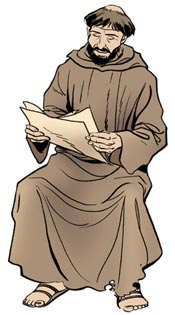 You are holy, Lord, the only God,
You are holy, Lord, the only God,
and your deeds are wonderful.
You are strong.
You are great.
You are the Most High.
You are Almighty.
You, Holy Father are King of heaven and earth.
You are Three and One, Lord God, all good.
You are good, all good, supreme good,
Lord God, living and true.
You are love. You are wisdom.
You are humility. You are endurance.
You are rest. You are peace.
You are joy and gladness.
You are justice and moderation.
You are all our riches, and you suffice for us.
You are beauty, you are gentleness,
You are our protector, you are our guardian and defender,
You are our courage. You are our haven and our hope.
You are our faith, our great consolation.
You are our eternal life, great and wonderful Lord,
God Almighty, merciful Savior! * In praise of God given to Brother Leo, Franciscan Editions, 1981 (2nd ed.), Saint Francis of Assisi - Documents, Th. Desbonnets, D. Voreux, p. 152.
Francis lifted his pen and stopped. He could have continued writing like that for hours. It was a quiet overflowing of his heart. He was not looking to teach, even less to prove anything. He was simply singing, not worrying about organizing his thoughts. It was endless, unrehearsed praise. A game of getting closer to an ineffable reality that we never tire of contemplating, without ever being able to fully and truly express it.
Leo, silent and delighted, was watching Francis. The latter starts writing again. This time it was a blessing addressed to Leo. A very biblical blessing:
« The Lord bless you and keep you.
May He show His face to you and have mercy.
May He turn His countenance to you and give you peace.
The Lord bless you, Brother Leo * Ibid, p. 153. ! »
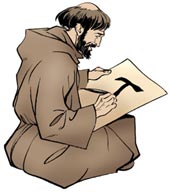 And Francis drew the Greek letter Tau, in the form of a capital T, on the brother’s name. It was his signature. It was also the sign of those saved, according to the prophet Ezekiel’s text.
And Francis drew the Greek letter Tau, in the form of a capital T, on the brother’s name. It was his signature. It was also the sign of those saved, according to the prophet Ezekiel’s text.
« Here you are,” says Francis to Leo. “Take this parchment and keep it with you, until you die. And may the Lord our God’s great tenderness descend on you!”
Leo was thrilled. He hadn’t dared hope for so much. As for Francis, his joy was also great. For in the very simple language of a litany of praise he had just written and given to Leo the memorial of his mystical experience on Mount Laverne. It was his thanksgiving to God for everything he had received in that place, a memorial of gratitude.
Leo received this writing as such. He later wrote down on the parchment: “Two years before his death, the blessed Francis spent forty days on Mount Laverne from the Feast of the Assumption of the holy Virgin Mary until the September Feast of Saint Michael, in honor of the Blessed Virgin Mary, the Mother of God, and the blessed Michael the Archangel. And the Lord's hand was upon him. After the vision and message of the Seraph and the impression of Christ's stigmata upon his body, he composed these praises written on the other side of this page and wrote them in his own hand, thanking God for the kindness bestowed on him. * Ibid, p. 152.”
The divine joy of existence
When the next day Leo came back to see Francis, his face shone like the sun. He told how his confusion, from which he had cruelly suffered, had completely disappeared after reading the text. Peace had returned to his soul, with God’s great tenderness. Francis tells him: “Those lines I wrote and gave to you are not at all a magic formula; they contain however a remarkable secret.” “What secret?” asks Leo, intrigued. “They are words of adoration and praise,” says Francis. “He who takes them to heart and opens himself to a spirit of adoration and praise experiences a delight that takes him out of himself. He stops worrying about his future and thinking only of himself. He no longer wonders where he is in relation to God. Fascinated by God’s marvelous reality, he lives more in Him who he contemplates than in himself. His whole being becomes a delighted gaze. No longer does it matter where he is with God! He no longer questions. God is, that’s enough. Without even realizing it, he enters into God’s joy; he meets the great divine joy of existence.”
Become again as little children
To faith in the Word, as we talked about above, we see that we need to add the grace of wonder. We can experience a true mystical encounter without being in a state of rapture but not without a state of wonder. Moreover, rapture is perhaps only another word for wonder. All mystical experience, all life in union with God, even the slightest, is a wondrous experience: an experience of wonderful God in his communication of himself. Jesus said that we can only enter into the kingdom of God with the soul of a child (Mk 10:15). Through the Word itself, we are invited to find again, in old age, a child’s sense of delight and wonder: a child’s rapturous eyes before the miracle of Life revealed in its fullness. “We saw his glory” (Jn 1 :14). Only the enraptured contemplation of God’s gift can take us out of ourselves, enlarge our hearts and teach us to love like God loves. “If you knew God’s gift…” says Jesus to the Samaritan. Yes, if you knew, your heart would ignite, your heart would be like the burning Bush.
"Enraptured by you, Father, we have only as our one offering the acceptance of your love. * The liturgy of the hours, CFC." Wonder engenders celebration, and celebration, festivities: "it is good to sing psalms to our God - how pleasant to praise him." (Ps 147 :1). Let us listen to the call that the Word thrusts at us : " Awake, my glory, awake, lyre and harp, that I may awake the Dawn!" (Ps 57 [56]:8). The light of dawn, sunrise in the soul, such is God’s communication to us who believe in his Word.
The Poor Man of Assisi, it is said, invented the Christmas nativity scene. He certainly contributed to spreading the practice. But the most important part of this was his having seen and then having portrayed the Nativity in another way: with a pure heart and through a child’s eyes. “I want to see,” he said, “with my human eyes, the Child, as He was, lying in a manger and sleeping on the hay between a cow and donkey…” It was a new and naive idea, but also marvelous and wonderful, like only poets have: to see and portray, with a child’s eyes, God in His “tender advent”. Nothing was more important for the future of the world. In a society of merchants, dominated by greed for money, it was necessary to present for contemplation God’s gift given freely. In a world of clerks dreaming of theocracy, it was urgent to rediscover God’s humility. And in a time of crusade and so-called holy wars, what could be more important than showing God’s tenderness? And while Christians built ever higher cathedral towers and steeples into the sky, like a blazing Te Deum, Francis of Assisi and his first companions meditated on, in a stable’s obscurity, God coming into the world in a child’s fragility; they rediscovered the marvelous source. Opening up to this divine communication, they became what they meditated on. And in the creating joy, they gave God the world, and man, and God!
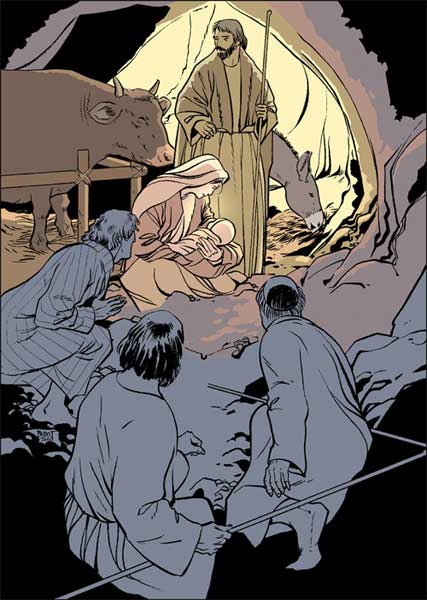
PRAYER AND LITURGY
Articleo 8.
Jesus was the true adorer of the Father : through his example, they will make prayer and contemplation the soul of their life and actions. * Vatican II Decree on the apostolate of the laity : Since Christ, sent by the Father, is the source and origin of the whole apostolate of the Church, the success of the lay apostolate depends upon the laity's living union with Christ, in keeping with the Lord's words, "He who abides in me, and I in him, bears much fruit, for without me you can do nothing" (John 15:5). This life of intimate union with Christ in the Church is nourished by spiritual aids which are common to all the faithful, especially active participation in the sacred liturgy. These are to be used by the laity in such a way that while correctly fulfilling their secular duties in the ordinary conditions of life, they do not separate union with Christ from their life but rather, performing their work according to God's will, they grow in that union.
To relive themselves the mysteries of Christ’s life, that they participate in the sacramental life of the Church, especially the Eucharist; they will equally join in liturgical prayer in one of the forms that is proposed.
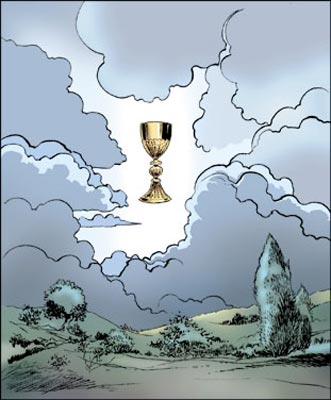
The first comment below will try to show us how Jesus was the true adorer of the Father. But what is an adorer? The first two of the Ten Commandments will help us answer this question. Some gospel references at the end of this chapter witness to the fact that Jesus prays all during his mission on this earth. And our Rule invites us to make prayer and contemplation the soul of our life and actions, as in Jesus’ example. Furthermore, will the following comments try to bring an answer to these questions: What is prayer? What are the different major expressions of prayer? And finally, how do we pray and when? Of course, to relive oneself the mysteries of Christ’s life, the inescapable preliminary is to know them. We will continue by recalling several of the mysteries of Christ’s earthly life and will highlight how their assimilation leads us to his divine filiation and his redeeming mission. Finally, since the speech on the bread of life has already shown and defined what the Eucharist was, we will orient the following comments to the Eucharist’s liturgical aspect. It is the covenant made with Abraham and the Mount Sinai covenant which will help us understand what liturgy is.
Your will be done on earth as it is in heaven
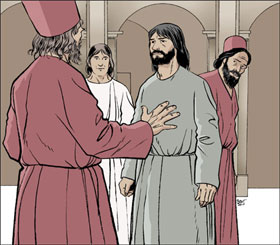 Saul was then King of Israel. The Lord had told him His will: to punish the Amalekites and to avow as anathema everything they possessed, meaning to save nothing, but to kill them all by the sword, from humans to cattle. Yet Saul brought back the best of the small and big cattle, in brief everything that was good, with the purpose of offering it as a sacrifice to Yahweh. The intention was good even if it didn’t correspond in every way to the divine will. However, the Lord lets him know his displeasure through his prophet Samuel: “Why then have you disobeyed the Lord? You have pounced on the spoil, thus displeasing the Lord.” (1 S 15:19). The Lord, indeed, had asked Saul to bring nothing back; Saul, in order to please God, should have brought nothing back, even if he intended the spoil (or a part of it) to be used as a sacrifice to the Lord. Samuel did not condemn the sacrificial cult in general. But it is inner obedience which pleases God, not just the exterior rite. To do the latter against God’s will is to pay homage to another God, it is to fall into idolatry.
Saul was then King of Israel. The Lord had told him His will: to punish the Amalekites and to avow as anathema everything they possessed, meaning to save nothing, but to kill them all by the sword, from humans to cattle. Yet Saul brought back the best of the small and big cattle, in brief everything that was good, with the purpose of offering it as a sacrifice to Yahweh. The intention was good even if it didn’t correspond in every way to the divine will. However, the Lord lets him know his displeasure through his prophet Samuel: “Why then have you disobeyed the Lord? You have pounced on the spoil, thus displeasing the Lord.” (1 S 15:19). The Lord, indeed, had asked Saul to bring nothing back; Saul, in order to please God, should have brought nothing back, even if he intended the spoil (or a part of it) to be used as a sacrifice to the Lord. Samuel did not condemn the sacrificial cult in general. But it is inner obedience which pleases God, not just the exterior rite. To do the latter against God’s will is to pay homage to another God, it is to fall into idolatry.
Jesus, who was the true adorer of the Father, tells us : “Not everyone who says to me, 'Lord, Lord,' will enter the kingdom of heaven, but only the one that does the will of my Father in heaven.” (Mt 7 :21). We find dotted throughout the Gospels, this recurring idea as a constant reminder of God’s Word: “My food is to do the will of the one who sent me and to finish his work.” (Jn 4 :34); “…and my judgment is just, because I do not seek my own will but the will of the one who sent me.” (Jn 5 :30) ; “And this is the will of the one who sent me, that I should not lose anything of what he gave me, but that I should raise it (on) the last day. For this is the will of my Father, that everyone who sees the Son and believes in him may have eternal life, and I shall raise him (on) the last day." (Jn 6 :39-40) “My Father, if it is possible, let this cup pass from me; yet, not as I will, but as you will.” (Mt 26 :39) So when a Pharisee asks Jesus, in order to embarrass him: “Master, what is the greatest commandment of your Law?”, Jesus responds with God’s words, reminding us of the Father’s will.
You will love the Lord your God with all your heart, with all your soul, and with all your mind
Jesus summed up man’s duties toward God in this saying: “You will love the Lord your God with all your heart, with all your soul, and with all your mind. * Mt 22: 37 and Lk 10: 27 : « ... with all your strength… ».” This immediately recalls the solemn cry: “Hear, O Israel! The Lord our God is one Lord » (Dt 6 :4). God has loved first. The love of the One God is recalled in the first of the “ten words.” The commandments then make explicit the response of love that man is called to give to his God * CCC 2083..
To adore God is to acknowledge him as God, as the Creator and Savior, the Lord and Master of everything that exists, as infinite and merciful Love. "You shall worship the Lord your God, and him only shall you serve," (Lk 4 :8) says Jesus, citing Deuteronomy (Dt 6 :13). To adore God is to acknowledge, in respect and absolute submission, the "nothingness of the creature" who would not exist but for God. To adore God is to praise and exalt him and to humble oneself, as Mary did in the Magnificat, confessing with gratitude that he has done great things and holy is his name (Lk 1:46-49). The worship of the one God sets man free from turning in on himself, from the slavery of sin and the idolatry of the world. * CCC 2096-2097.
Do not take my name in vain
Does man only take the Lord’s name in vain when he blasphemes? Alas no, not only. Can a son say, I love my father and I honor him, if he afterwards opposes everything his father desires? It is not by saying father, father, that we truly love. In the same way, faith’s prayer does not consist in saying only Lord, Lord, but in attuning the heart to the Father’s will (Mt 7:21). Does this Gospel saying mean that only the lowest can call on God? No, it is by sinners and all those who feel strangled by Satan that this Name must be invoked, meaning by all those who wish to be freed from sin and from the Seducer. Those who wish. That is what changes sacrilege into rite: to wish to be healed. To call on the Almighty for forgiveness and to be healed. To invoke him so as to make the Seducer flee. During the temptation, Eve did not call on the Lord in her time of trial. But if she had, Satan would have been put to flight, for God and Satan cannot coexist in the same place, in the same heart. Let us always keep this thought, and in all sincerity, call on the Lord. His name is salvation. Let us purify our hearts unceasingly, by writing there with love his Name: God. No lying prayers. No prayers out of habit. But with your heart, your thought, your acts, with all your being, say his Name : God. Let us say it to be sustained. Let us say it to be forgiven. Let us understand the meaning of the God of Mount Sinai’s word: “In vain” we pronounce the Name of “God” if we say it without doing good. That is sin. But it isn’t “in vain” when the beating of our heart, every minute of the day, in all honest actions, when need, temptation and suffering bring to our lips the filial words of love: “Come, my God!” Then, truly, we do not sin by naming the holy Name of God. * From Centro Editoriale Valtortiano, Isola del Liri, Italy, The Gospel as it was revealed to me, Maria Valtorta, Vol. 2, chap. 88, p. 508.
Prayer is the heart’s conversation with God
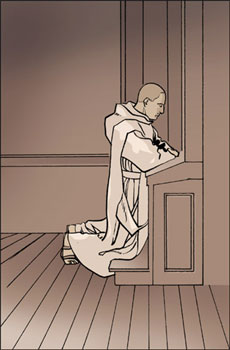 Prayer should be man’s habitual state. When we want to talk to the Lord, let us enter into the peace of our inner dwelling and talk to the King of angels. Let us talk to our Father in the secret of our heart and inner dwelling. Let us leave outside everything which belongs to the world: the craze of being noticed ; of edifying; the compunction for long prayers full of words, words, words, monotonous, tepid and without love. For the love of God! Let us get rid of measured prayer. Let us not spend hours and hours in a monologue which only the lips repeat. For that is true soliloquy that even our guardian angel doesn’t listen to, being such vain rumor that he tries to remediate it by diving into an ardent inner prayer for the fool he is guarding. Truly, there are people who would not use those hours differently even if God appeared to them in person to tell them: “The salvation of the world relies on you abandoning this soulless chattering, going in all simplicity to draw water from a well and watering the ground for love of Me and your fellowman.” Truly, let us not believe that a monologue is more important than a courteous welcome of a visitor or charitable aid given to someone in need. To act in such a way is the same as falling into idolatry of prayer. Prayer is an act of love. We can love as much by doing the dishes as by praying, by helping a disabled person as by meditating. It is enough to infuse all your being and activity in love. Let us not be afraid! The Father sees. The Father understands. The Father listens. The Father gives what is needed. What graces does he not give for one lonely sigh of love, true, perfect ! What abundance of graces for an intimate sacrifice made with love! * From Centro Editoriale Valtortiano, Isola del Liri, Italy, The Gospel as it was revealed to me, Maria Valtorta, Vol. 3, chap. 32, p. 172.
Prayer should be man’s habitual state. When we want to talk to the Lord, let us enter into the peace of our inner dwelling and talk to the King of angels. Let us talk to our Father in the secret of our heart and inner dwelling. Let us leave outside everything which belongs to the world: the craze of being noticed ; of edifying; the compunction for long prayers full of words, words, words, monotonous, tepid and without love. For the love of God! Let us get rid of measured prayer. Let us not spend hours and hours in a monologue which only the lips repeat. For that is true soliloquy that even our guardian angel doesn’t listen to, being such vain rumor that he tries to remediate it by diving into an ardent inner prayer for the fool he is guarding. Truly, there are people who would not use those hours differently even if God appeared to them in person to tell them: “The salvation of the world relies on you abandoning this soulless chattering, going in all simplicity to draw water from a well and watering the ground for love of Me and your fellowman.” Truly, let us not believe that a monologue is more important than a courteous welcome of a visitor or charitable aid given to someone in need. To act in such a way is the same as falling into idolatry of prayer. Prayer is an act of love. We can love as much by doing the dishes as by praying, by helping a disabled person as by meditating. It is enough to infuse all your being and activity in love. Let us not be afraid! The Father sees. The Father understands. The Father listens. The Father gives what is needed. What graces does he not give for one lonely sigh of love, true, perfect ! What abundance of graces for an intimate sacrifice made with love! * From Centro Editoriale Valtortiano, Isola del Liri, Italy, The Gospel as it was revealed to me, Maria Valtorta, Vol. 3, chap. 32, p. 172.
Take time to be for the Lord
Christian Tradition has retained three major expressions of prayer: vocal meditative, and contemplative. They have one basic trait in common: composure of heart. Vigilance in keeping the Word and dwelling in the presence of God makes these three types of expression the culminating point in prayer life. * CCC 2699.
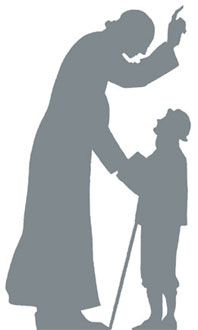 The holiest prayer is that which Jesus taught us himself : the Our Father. Oh ! If we knew how to say this prayer, tasting every sentence, joining our thoughts and heart to each word, how our lives would be transformed!
The holiest prayer is that which Jesus taught us himself : the Our Father. Oh ! If we knew how to say this prayer, tasting every sentence, joining our thoughts and heart to each word, how our lives would be transformed!
Meditation engages thought, imagination, emotion, and desire. This mobilization of faculties is necessary in order to deepen our convictions of faith, prompt the conversion of our heart, and strengthen our will to follow Christ. Christian prayer tries above all to meditate on the mysteries of Christ, as in lectio divina or the rosary. This form of prayerful reflection is of great value, but Christian prayer should go further: to the knowledge of the love of the Lord Jesus, to union with him. * CCC 2708.
In joy as in pain, in peace as in war, our minds need to dive into the ocean of contemplation to rebuild what the world and its trials and tribulations have pulled down. We should pray aloud, but not only. Not that it is useless or frowned upon by God. But much more useful is lifting up the spirit to God, meditation. Let us contemplate his divine perfection. Let us recognize our misery. Let us thank the Lord who sustained us so we were able to avoid sinning. Let us give thanks for his forgiveness which uplifts us. In a word, let us really pray, that is to say love. Because inner prayer, in order to be what it should be, must be love. * Our Supreme Pontiff John-Paul II tells us : « a pause for true adoration has greater value and produces greater spiritual fruit than the most intense activity, even an apostolic activity. This is the most urgent challenge the members of a religious order must face in opposition to society where efficiency has become an idol on the altar of which it is not rare to sacrifice one’s own human dignity.
The choice of the time and duration of the prayer arises from a determined will, revealing the secrets of the heart. One does not undertake contemplative prayer only when one has the time: one makes time for the Lord, with the firm determination not to give up, no matter what trials and dryness one may encounter. One cannot always meditate, but one can always enter into inner prayer, independently of the conditions of health, work, or emotional state. The heart is the place of this quest and encounter, in poverty and in faith * CCC 2710. Contemplation is a gaze of faith, fixed on Jesus. "I look at Him and He looks at me," is what a certain peasant of Ars in the time of his holy parish priest used to say while praying before the tabernacle. This focus on Jesus is a renunciation of self. His gaze purifies our heart; the light of Jesus’ countenance illuminates the eyes of our heart and teaches us to see everything in the light of his truth and compassion for all men. Contemplation also turns its gaze on the mysteries of the life of Christ. Thus it learns the "inner knowledge of our Lord," the more to love him and follow him * CCC 2715.. But how do we pray, and in such a hectic life, when do we pray?
So that delivered from our enemies’ hands, we serve him in justice and holiness, in his presence all the days of our lives
Union with God is keeping him present at all times so as to praise and invoke him. If we do this, then we will grow in our spiritual life. The day is given to us by God, entirely, whether bright or dark: day and night. It is a gift to live and to have light. And the way in which we live is a kind of sanctification. So we must sanctify the moments of the whole day to remain in holiness, keeping in our hearts the Almighty and his goodness and, at the same time, keeping the devil far away. Let us observe birds: at the first rays of sunlight, they sing, they bless the light. We should also bless the light which is God’s gift. We should bless God who gives us the light and who is Light. To desire it from dawn’s first light so as to put a seal of light, a note of light on the whole day as it progresses, so that it will be totally luminous and holy, and to join in with all creation to sing hosanna to the Creator. Then as the hours pass and they show us that there is pain and ignorance in the world: continue to pray so that pain may be relieved and ignorance disappear, and so that God is known, loved and prayed to by all men who, if they knew God, would always be comforted, even in their suffering. In the sixth hour, pray for love of family, taste this gift of unity with those who love us. That is also God’s gift. And pray that food not go from being necessary to becoming an occasion of sin. In the ninth hour, pray that by the Sacrifice of this hour God’s Reign comes into the world, and that all those who believe in his Word may be redeemed. At dusk, pray while reflecting that death is the dusk which awaits us all. Pray that the twilight of our day or our life always takes place with our soul in a state of grace. And when the lamps are lit, pray, giving thanks for the day which is done and asking for protection and forgiveness so as to be able to fall asleep without fear of judgment or the devil’s attacks. Pray, finally, to ward off sin during the night, to keep Satan away from the weak, that the guilty may feel contrition through reflection and make good resolutions which will become reality at sunrise. * From Centro Editoriale Valtortiano, Isola del Liri, Italy, The Gospel as it was revealed to me, Maria Valtorta, Vol. 4, chap. 155, p. 457. That is the how and why of a just person’s prayer during an entire day. * In passing, when our Supreme Pontiff John-Paul II was on a trip to Hungary (August 1991), he added several words to the response that he had made, at a subsequent greeting of the President, and here is the translation: « You have touched, Mr. President, the most important point for the pope. The duty and principal activity of the pope is not to preach, but to pray. Everything should be based on prayer. My visit to Hungary and my daily relations with this country are equally founded on prayer. ».
To live the mysteries of Christ’s life
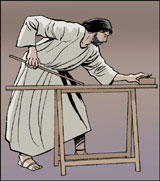 His deeds, miracles and words all revealed that "in him the whole fullness of deity dwells bodily" (Col 2:9). His humanity appeared as "sacrament", that is, the sign and instrument of his divinity and of the salvation he brings: what was visible in his earthly life leads to the invisible mystery * There are two different conceptions of the mystery: the Hellenistic or the Pauline conception. The Fathers of the Church will bring these two conceptions closer together : 1. From the Greek mustèrion : whereby or to what we are initiated (mustès). The Greek term originally designated the more or less secret rites whereby one was initiated into a religion, and through which one entered into relations with the divinity. 2. The Biblical notion of « mystery » seems independent of the Greek notion. The « Mystery » is the secret of the divine plan of salvation ; conceived by the divine Wisdom of all eternity, it is put into action in the history of salvation and is fulfilled in its heart in Christ’s sacrifice, this « paschal Mystery » which condenses all the « Mystery ». The apostles received the mission to reveal the full scope of the Mystery of Christ. of his divine filiation and redemptive mission. * CCC 515 (extract). Christ did not live his life for himself but for us, from his Incarnation "for us men and for our salvation" to his death "for our sins" (1 Co 15 :3) and Resurrection "for our justification"(Rm 4:25). He is still "our advocate with the Father", who "always lives to make intercession" for us (He 7:25). In all of his life Jesus presents himself as our model.
His deeds, miracles and words all revealed that "in him the whole fullness of deity dwells bodily" (Col 2:9). His humanity appeared as "sacrament", that is, the sign and instrument of his divinity and of the salvation he brings: what was visible in his earthly life leads to the invisible mystery * There are two different conceptions of the mystery: the Hellenistic or the Pauline conception. The Fathers of the Church will bring these two conceptions closer together : 1. From the Greek mustèrion : whereby or to what we are initiated (mustès). The Greek term originally designated the more or less secret rites whereby one was initiated into a religion, and through which one entered into relations with the divinity. 2. The Biblical notion of « mystery » seems independent of the Greek notion. The « Mystery » is the secret of the divine plan of salvation ; conceived by the divine Wisdom of all eternity, it is put into action in the history of salvation and is fulfilled in its heart in Christ’s sacrifice, this « paschal Mystery » which condenses all the « Mystery ». The apostles received the mission to reveal the full scope of the Mystery of Christ. of his divine filiation and redemptive mission. * CCC 515 (extract). Christ did not live his life for himself but for us, from his Incarnation "for us men and for our salvation" to his death "for our sins" (1 Co 15 :3) and Resurrection "for our justification"(Rm 4:25). He is still "our advocate with the Father", who "always lives to make intercession" for us (He 7:25). In all of his life Jesus presents himself as our model.
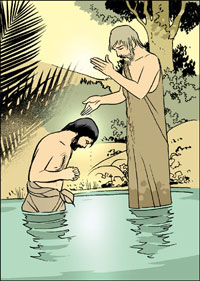 In humbling himself, he has given us an example to imitate, through his prayer he draws us to pray, and by his poverty he calls us to accept freely the privation and persecutions that may come our way. We are called only to become one with him. * CCC 519-521 (extracts). So we need to read, meditate on and live the mysteries of Christ’s life :
In humbling himself, he has given us an example to imitate, through his prayer he draws us to pray, and by his poverty he calls us to accept freely the privation and persecutions that may come our way. We are called only to become one with him. * CCC 519-521 (extracts). So we need to read, meditate on and live the mysteries of Christ’s life :
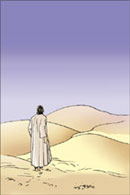
- No one, whether shepherd or wise man, can approach God here below except by kneeling before the manger at Bethlehem and adoring him hidden in the weakness of a new-born child.
- By his obedience to Mary and Joseph, as well as by his humble work during the long years in Nazareth, Jesus gives us the example of holiness in the daily life of family and work.
- From the beginning of his public life, at his baptism, Jesus is the "Servant", wholly consecrated to the redemptive work that he will accomplish by the "baptism" of his Passion.
- The temptation in the desert shows Jesus, the humble Messiah, who triumphs over Satan by his total adherence to the plan of salvation willed by the Father.
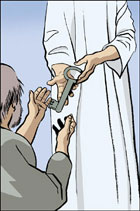
- The kingdom of heaven was inaugurated on earth by Christ. "This kingdom shone out before men in the word, in the works and in the presence of Christ". The Church is the seed and beginning of this kingdom. Its keys are entrusted to Peter.
- Christ's Transfiguration aims at strengthening the apostles' faith in anticipation of his Passion: the ascent on to the "high mountain" prepares for the ascent to Calvary. Christ, Head of the Church, manifests what his Body contains and radiates in the sacraments: "the hope of glory" (Col 1:27);
- Jesus went up to Jerusalem voluntarily, knowing well that there he would die a violent death because of the opposition of sinners;
- Jesus' entry into Jerusalem manifests the coming of the kingdom that the Messiah-King, welcomed into his city by children and the humble of heart, is going to accomplish by the Passover of his Death and Resurrection. * CCC 563-570.
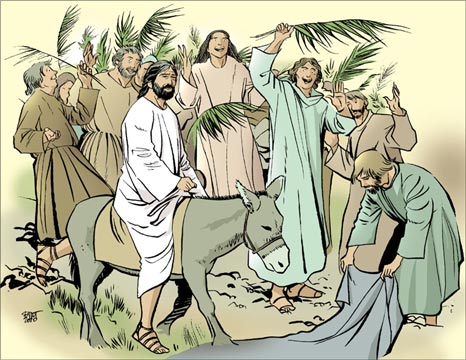
The Covenant with Abraham
« Go forth from the land of your kinsfolk and from your father's house * We cannot help transposing the sentence into what it implies for the person himself : “Go forth from the land of your kinsfolk and from your father's house” has no other immediate meaning than leaving everything which represents “me”. Leaving your “me”, the text shouts at us, “for the land that I will show you”, meaning to meet Me, Me your Creator, your Savior and your Redeemer, and I will let you participate in My divine Life. Later the Lord tells us precisely: “So in the same way, none of you can be my disciple without giving up all that he owns.” Lk 14 :33. to a land that I will show you. I will make of you a great nation, and I will bless you; I will make your name great, so that you will be a blessing. » (Gn 12 :1-2). The story of Abraham’s vocation is succinct. It indicates Yahweh’s initiative, inviting the reader to leave everything so as to obey his voice. To look closely at the terms used, we cannot help but see them in the light of the end of the Yahwist story of creation: “That is why a man leaves his father and mother and clings to his wife, and the two of them become one body (Gn 2:24).” The relationship between Yahweh and Abraham is in nature as powerful as that between a wife and husband. Abraham doesn’t hesitate; far from rejecting the mysterious propositions of He who is addressing him, he obeys, meaning he listens and acts: “Abram went as the Lord directed him, and Lot went with him. Abram was seventy-five years old when he left Haran” (Gn 12:4). From the beginning, Yahweh made him a promise, to become a great people: immediately, the Covenant seems to be about not a lone individual, as great as he is, but an entire people. However, the years go by during which numerous events happen but still no sign of the promise being kept. So, and after the curious passage concerning Melchizedek, priest of God Almighty, and his offering of bread and wine (Gn 14:18), Abram receives from God in a vision the certainty of reward: “Some time after these events, this word of the Lord came to Abram in a vision: "Fear not, Abram! I am your shield; I will make your reward very great” (Gn 15:1). But there, Abraham, for the first time, expressed a concern to God: “O Lord God, what good will your gifts be, if I keep on being childless and have as my heir the steward of my house, Eliezer? See, you have given me no offspring, and so one of my servants will be my heir.” Yahweh reiterates then the promise of innumerable descendants for Abraham, but specifying formally that it would come from an heir of his own flesh and blood: “No, that one shall not be your heir; your own issue shall be your heir. …Look up at the sky and count the stars, if you can. …Just so shall your descendants be” (Gn 15:4-5). This time, Abraham requests a guarantee. And Yahweh responds by the rite of covenant which consists in, for the contracting parties, passing among animal carcasses cut in half. Thus these animals’ fate would be the same for the person if he was unfaithful to his commitment. This rite is expressed in Hebrew by the formula “to break covenant”. “When the sun had set and it was dark, there appeared a smoking brazier and a flaming torch, which passed between those pieces” (Gn 15 :17). In the symbol of the fire * Symbol of the fire we find in the passages of: the burning bush (Ex 3 :2); the column of fire (Ex 13:21); smoking Mount Sinai (Ex 19:18)., it is Yahweh who goes by, and He goes by alone since his covenant is a unilateral pact, a divine initiative. Another narrative of the Covenant between Abraham and Yahweh (Gn 17) brings in two important details: the change of name from Abram to Abraham and the circumcision. These two changes should be understood as the intimate signs of Yahweh’s ascendancy over his partner. The Covenant is firstly an act of God who works through his ally; it is also, necessarily, the act of this ally who consents to God’s actions, who is passive and who follows. The Covenant is fruitful, especially as it implies the promise of posterity. God works himself, there where the course of natural things seems closed. Under the oak of Mamre, the three voyagers, in whom tradition saw the Trinity’s evocation, receiving the magnanimous hospitality of Abraham. The meal, in a way, is a meal of covenant with the Trinity and at the end of it, and despite Sarah * The text specifies indeed: « Now Abraham and Sarah were old, advanced in years, and Sarah had stopped having her womanly periods. » Gn 18 :11.Being advanced in years is even given to us in the preceding chapter: « Can a child be born to a man who is a hundred years old? Or can Sarah give birth at ninety ? » (Gn 17 :17), Abraham’s wife, laughing, the visitor’s prophecy comes true: “I will surely return to you about this time next year, and Sarah will then have a son (Gn 18:10).” God renders Abraham fertile, giving him the son of the promise: Isaac, fruit of Yahweh’s unconditional love and Abraham’s faith. * These lines (as well as those which follow) are extracted from C.L.D. Editions, 1981, The liturgy in the old Covenant, Dom Robert Le Gall, Introduction and ch. 3-4.
Render every good to the Lord
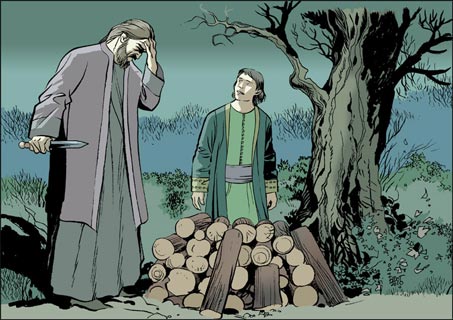 But this same Isaac, being the only one, the darling of Abraham, God asks him from Abraham: “Take your son Isaac, your only one, whom you love, and go to the land of Moriah. There you shall offer him up as a holocaust on a height that I will point out to you” (Gn 22 :2). Isaac appears then as the touchstone of the covenant, in both ways: descending, from Yahweh to Abraham (God who gives him a son) and ascending, from Abraham to Yahweh (Abraham who offers his son to Yahweh). God had to have trust in he who the Jewish, Christian and Muslim traditions gave the name Friend of God, to ask of him such an ordeal: sacrifice his only son, God’s gift, and yet necessary condition for the promise’s fulfillment. Abraham knows what the expression “send up” your son means: it is indeed about a holocaust, which makes the victim “pass” and “go up” with God. What a wrenching heartbreak this must have been for Abraham to prepare all that was necessary for the sacrifice, to walk three days to get to the prescribed spot and there, to present his offering: “When they came to the place of which God had told him, Abraham built an altar there and arranged the wood on it. Next he tied up his son Isaac, and put him on top of the wood on the altar. Then he reached out and took the knife to slaughter his son” (Gn 22 :9-10). The meaning of this event is decisive. The Covenant sealed the union between Yahweh and Abraham for this joint effort, desired by God that is the fertility of the Patriarch. So that such a Covenant be solid, it is necessary that a reciprocal, total faith bind the partners together and remain, no matter the circumstances. Abraham who received everything from his divine Friend – to be chosen, promise, son – is sure of God. That is why he doesn’t hesitate to offer him, in spite of the pain that this sacrifice costs him, his only son, the only chance he has to see the promise fulfilled. God, who gives and gives himself, expects his counterpart to do the same * Blessed is the servant who pays homage to the Lord for everything. He who on the contrary claims a part for himself hides in his heart the Lord God’s money, and what he believed to possess alone will be taken from him. Adm. 19.; thus the good that the Covenant procures is secondary to the Covenant itself, which joins man to God. Abraham accepts that neither the mission that God invested him with, nor his dream, which was all his life in the highest sense, can come between God and himself. To give an only son is to give more than oneself: it is to go to the farthest point of giving. God, in the liturgy, asks us indeed to go that far. He will refuse Isaac’s immolation, but He wants the only to be offered. God doesn’t want his children’s blood, but he cannot give up on our gift in its entirety. God gives everything so that we render him everything. The offering of the son of the promise, on whom depends all posterity, is what makes Abraham’s sacrifice so great.
But this same Isaac, being the only one, the darling of Abraham, God asks him from Abraham: “Take your son Isaac, your only one, whom you love, and go to the land of Moriah. There you shall offer him up as a holocaust on a height that I will point out to you” (Gn 22 :2). Isaac appears then as the touchstone of the covenant, in both ways: descending, from Yahweh to Abraham (God who gives him a son) and ascending, from Abraham to Yahweh (Abraham who offers his son to Yahweh). God had to have trust in he who the Jewish, Christian and Muslim traditions gave the name Friend of God, to ask of him such an ordeal: sacrifice his only son, God’s gift, and yet necessary condition for the promise’s fulfillment. Abraham knows what the expression “send up” your son means: it is indeed about a holocaust, which makes the victim “pass” and “go up” with God. What a wrenching heartbreak this must have been for Abraham to prepare all that was necessary for the sacrifice, to walk three days to get to the prescribed spot and there, to present his offering: “When they came to the place of which God had told him, Abraham built an altar there and arranged the wood on it. Next he tied up his son Isaac, and put him on top of the wood on the altar. Then he reached out and took the knife to slaughter his son” (Gn 22 :9-10). The meaning of this event is decisive. The Covenant sealed the union between Yahweh and Abraham for this joint effort, desired by God that is the fertility of the Patriarch. So that such a Covenant be solid, it is necessary that a reciprocal, total faith bind the partners together and remain, no matter the circumstances. Abraham who received everything from his divine Friend – to be chosen, promise, son – is sure of God. That is why he doesn’t hesitate to offer him, in spite of the pain that this sacrifice costs him, his only son, the only chance he has to see the promise fulfilled. God, who gives and gives himself, expects his counterpart to do the same * Blessed is the servant who pays homage to the Lord for everything. He who on the contrary claims a part for himself hides in his heart the Lord God’s money, and what he believed to possess alone will be taken from him. Adm. 19.; thus the good that the Covenant procures is secondary to the Covenant itself, which joins man to God. Abraham accepts that neither the mission that God invested him with, nor his dream, which was all his life in the highest sense, can come between God and himself. To give an only son is to give more than oneself: it is to go to the farthest point of giving. God, in the liturgy, asks us indeed to go that far. He will refuse Isaac’s immolation, but He wants the only to be offered. God doesn’t want his children’s blood, but he cannot give up on our gift in its entirety. God gives everything so that we render him everything. The offering of the son of the promise, on whom depends all posterity, is what makes Abraham’s sacrifice so great.
Altars mark out Abraham’s route: in Shechem, at the Oak of Moreh, (Gn 12:6-7) where Yahweh appeared to him; in Bethel (Gn 12:8; 13:3-4), where he invoked the name of Yahweh; in Hebron, at the Oak of Mamre (Gn 13 :18) where he built an altar. The altar represents a memorial of the meeting with God, both a souvenir of the past and a token of the promise to come. For the patriarch, the liturgy consists in reviving the Covenant at the sites of divine encounter. There, God appeared to him, there he invoked his name. Isaac’s sacrifice is the most complete and greatest act of “liturgy” which unites the two allies. Thus, from the beginning of the history of salvation, the essential principal of the liturgy seems outlined for us: encounter between God and man, to seal or revive their Covenant.
When you bring the people out of Egypt, you serve God
To Abraham, he gave Isaac. And to Isaac, he gave Jacob. About four hundred years after Jacob, the descendants of the three patriarchs are enslaved in Egypt. But God is delivering on his promise. He prepares a man for the mission to lead his people, his spouse, to the place of the Covenant. This man, we know, is Moses. God waits for him in the desert. He calls him by name and reveals himself to Moses in the burning bush: “Moses! Moses! … I am the God of your father,” he continued, “the God of Abraham, the God of Isaac, the God of Jacob… I have witnessed the affliction of my people in Egypt and have heard their cry of complaint against their slave drivers… Therefore I have come down to rescue them from the hands of the Egyptians and lead them out of that land into a good and spacious land, a land flowing with milk and honey” (Ex 3 :4-8).
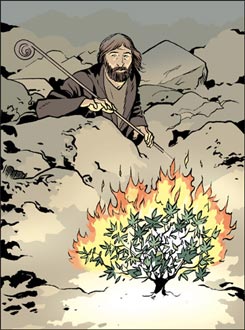 The God of the promise saw the misery of these people he calls his people, and he “comes down” to liberate them through Moses. In Mount Sinai, the sign Yahweh gives Moses to guarantee the truth of his mission will hardly be proof, for it is none other than the fulfillment of Israel’s salvation, but in the form of a liturgy: “I will be with you; and this shall be your proof that it is I who have sent you: when you bring my people out of Egypt, you will worship God on this very mountain” (Ex 3 :12). Indeed the word “worship” or serve here is understood in its liturgical meaning. Of course the service of God is not limited to liturgical works. However, liturgy is a work formally directed toward God. It remains the most excellent service because it brings, in homage to God Creator and Savior, the best human activity. The liturgy is a respectful service of the divinity. It doesn’t try to subjugate God to man’s needs, which would be a magic trick. It is no more a subjugation of man to God, which would be a master-slave situation. Liturgy is then the service of God by the People of God. Only Revelation gives to the service of God the perfect personal note: a relationship marked by the respect of love, on both sides, the People’s and God’s. Indeed, in worship, the People approach their God to serve him; but Yahweh also comes down to his people. He brings himself to them and is known through his saving intervention.
The God of the promise saw the misery of these people he calls his people, and he “comes down” to liberate them through Moses. In Mount Sinai, the sign Yahweh gives Moses to guarantee the truth of his mission will hardly be proof, for it is none other than the fulfillment of Israel’s salvation, but in the form of a liturgy: “I will be with you; and this shall be your proof that it is I who have sent you: when you bring my people out of Egypt, you will worship God on this very mountain” (Ex 3 :12). Indeed the word “worship” or serve here is understood in its liturgical meaning. Of course the service of God is not limited to liturgical works. However, liturgy is a work formally directed toward God. It remains the most excellent service because it brings, in homage to God Creator and Savior, the best human activity. The liturgy is a respectful service of the divinity. It doesn’t try to subjugate God to man’s needs, which would be a magic trick. It is no more a subjugation of man to God, which would be a master-slave situation. Liturgy is then the service of God by the People of God. Only Revelation gives to the service of God the perfect personal note: a relationship marked by the respect of love, on both sides, the People’s and God’s. Indeed, in worship, the People approach their God to serve him; but Yahweh also comes down to his people. He brings himself to them and is known through his saving intervention.
Israel is aware of being served by its God. In the desert, the column of fire and the cloud were proof. Deuteronomy underlines this intimate relationship: “For what great nation is there that has gods so close to it as the Lord, our God, is to us whenever we call upon him?” (Dt 4:7). In the fullness of time, Yahweh’s Servant, who is the Son incarnate, will declare to have come, not to be served, but to serve (Mt 20 :28). Liturgy is this loving service between God and us. As we said above, Yahweh revealed himself to Moses to bring his people to this blessed worship. In turn, Moses gives no other motive to Pharaoh than this worship of Yahweh. The formula is repeated after each scourge inflicted on Pharaoh and his country: “Let my people go and worship in the desert.” (Ex 7 :16 ; 7 :26 ; 8 :16 ; 9 :1 ; 10 :3 ; 10 :7 ; 10 :11 ; 10 :26).
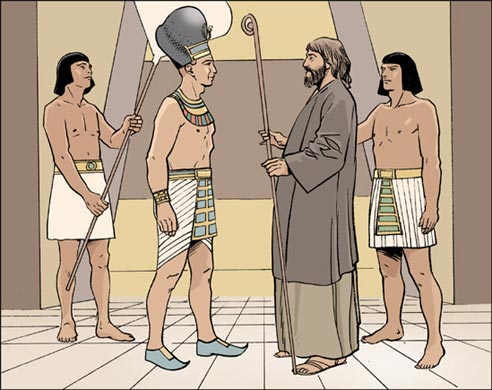
A covenant of people
A covenant is a law-like contract, binding two individual parties, aimed at defining their relationship in a stable way, either on a particular point or in general. We know that a political or economic alliance has specific interests at its heart: its objective is to procure reciprocal advantages for the contracting parties. The most complete type of covenant is matrimonial, which unites two spouses.
The God of Israel, Creator and Savior, is an individual being who has plans and who watches over their progress; he wants to establish relations with human beings who come from him but are different from him. A covenant is proposed in which the divine and human subjects remain what they are, and even become more and more so. The liturgy is the reciprocal act in which God and his people give themselves to each other, resume or restore the covenant that unites them.
The Covenant that God offers to his people will have political and economic consequences: when the People are threatened by an invader, they must trust in their God and not apply to help from an allied people (Is 7 :1-9; 37:30-35); in the same way, God of the Covenant will give them all they need to live and be happy (Dt 8 :11-18; Hs:2 10-24). But the Covenant will essentially be the mutual belonging between God and his People; all throughout the Bible, “the formula of the Covenant” repeats that God is for his People and the People are for their God: “I will take you as my own people, and you shall have me as your God” (Ex 6:7; Jr 31:33; Rv 21:3).
We may note that in human alliances, patrimonial or of friendship, the initiative in the encounter and subsequent stabilization comes in general from only one partner who “takes the first step”: either he creates reciprocity or he provides an opportunity for it to come about. God, through his unconditional and gracious initiative, inspires in us a response of love which is indeed consent. From the moment we consent to the Covenant, our life is God’s and God’s life is ours.
The liturgy, celebration of the Covenant
From the perspective we have just defined, liturgy is essentially the act in which God proposes the Covenant and we consent. It is firstly an act of God in our favor; it is then our act of acceptance to the grace which is given us. Liturgy is then the conclusion of a covenant which, as such, implies a common act by both partners. Throughout the history of salvation, it will be the reviving or celebration of an originally concluded bond, its regular restoration and, in Christ, its definitive perfection.


